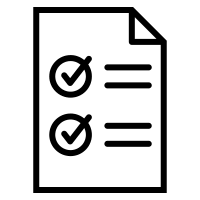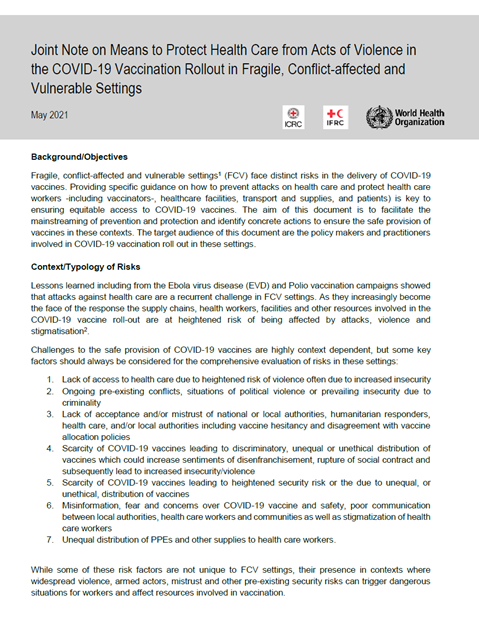JOINT NOTE
Vaccination in emergency settings: Joint Note from ICRC, IFRC and WHO

ICRC and partners take action
When planning and carrying out vaccination campaigns, health authorities and humanitarians have a lot to consider:
from logistics
to hygiene protocols
from training staff to monitoring the results of the campaign.
In emergency settings or areas with enhanced risks of violence, additional thought should be given to the protection and security of the vaccination teams and the community that will be touched by the campaign.
This joint note acts as a reminder to integrate protection thinking into vaccination work and proposes some concrete actions based on existing recommendations and good practices.
Hyo-Jeong Kim, WHO’s Focal Point for the Attacks on Healthcare Initiative
With these challenges in mind, the International Committee of the Red Cross (ICRC), the International Federation of Red Cross and Red Crescent Societies (IFRC) and the World Health Organization (WHO) have joined hands to offer support to national authorities, health and humanitarian organizations. The newly published JOIN NOTE brings forward pragmatic guidance in mitigating risks that might be observed in some areas where vaccinations teams are deployed.
In this support document, measures like community engagement and adoption of contingency plans are suggested. Moreover, the reinforcement of identification and communication procedures is pointed out as an important step to ensure that vaccination teams will not be caught off-guard while carrying out their activities in risk-prone areas.
Although this note is initially driven by the need to address recent COVID-19 vaccination plans, the measures indicated in the document could be easily applied to other vaccination campaigns or the work of mobile health teams. Including the aspects of security of health teams in all public health activities is always important, to ensure the integrity of all people involved and good outcomes of the health response.
According to Paola Forgione, part of the Health Care in Danger team at the ICRC, vaccination campaigns in conflict areas are often affected by the underlying political and military situation. In previous vaccination campaigns this has resulted in States denying access to the vaccine to people living in areas controlled by armed groups, in the exploitation of vaccination campaigns as a cover for intelligence military operations and in the general mistrust from some communities towards State-sponsored vaccination campaigns. These factors have led to several security incidents against vaccination teams, vehicles and facilities.
